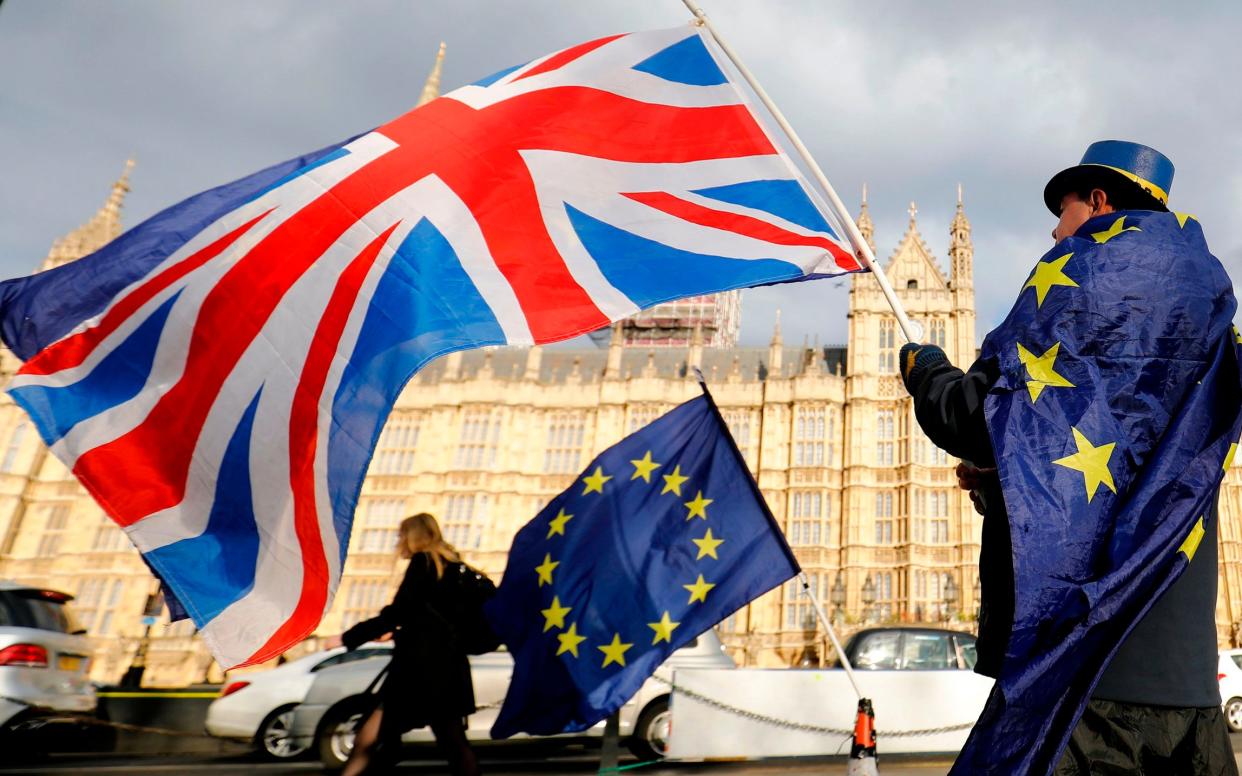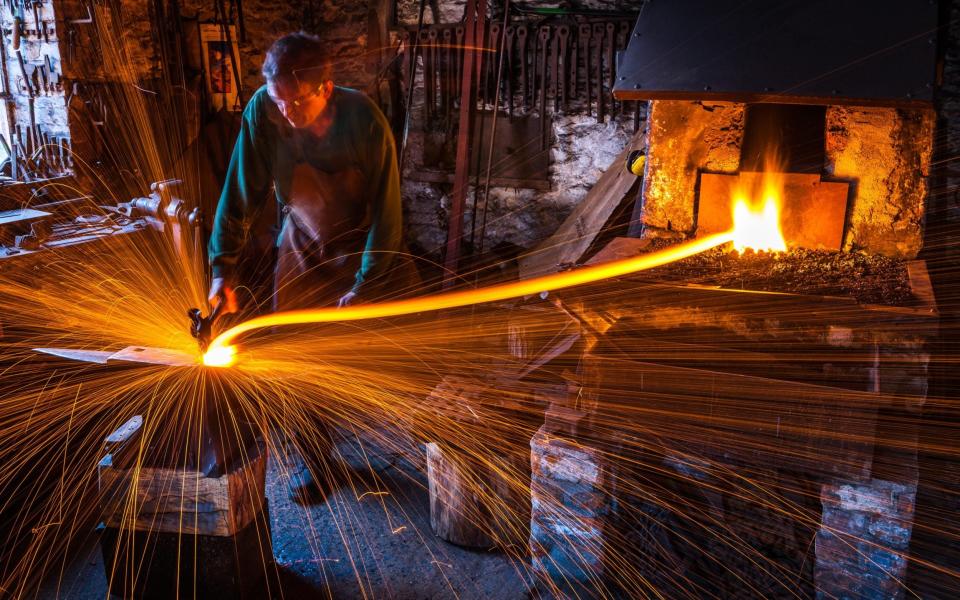Letters: Brexit was meant to reinstate an authority to which the British people feel allegiance

SIR – Janet Daley is right to describe the European Union as essentially undemocratic but wrong to imagine that this was the determining factor for most of us who voted Leave in 2016, even if it was for Ms Daley (“There is little point to Brexit if our leaders have given up on democracy”, Comment, February 12).
Had it been so, her corollary – the thesis of her article – would be true: it would be as well to be dictated to by Brussels as by Westminster. And this is indeed the unspoken assumption of our more passionate Europhiles.
But for the majority the question was (as it is still) not the mode of government but the source of the laws and the ultimate object of allegiance. At heart, we Brexiteers were and are very simple people, far too simple for sophisticated Remainers ever to understand.
We took European supranational pretensions at their face value, and decided that we didn’t wish to obey laws emanating from an alien authority or to profess a loyalty we didn’t feel.
Martin R Maloney
London N3
SIR – In the 2016 Brexit referendum 17.4 million of us voted to leave the EU – just 26 per cent of the British population – and we left.
In the Scottish referendum on independence in 2014, 30 per cent of the population voted for independence and did not gain it. Double standards?
In any case, should not any referendum on such major democratic change require at least 50 per cent of the whole population to agree to it?
Mike Tyler
Worthing, West Sussex
SIR – Janet Daley rightly bemoans the lack of difference now between the incumbent Conservative Party and the Labour Opposition.
However, Reform UK stands for traditional Conservative principles and has some sensible policies, which I encourage core Conservatives to read. Support for this party at the local elections could mean stepping towards a brighter future for the country.
Nick Denton
East Molesey, Surrey
Phones made in China
SIR – This week I received new telephones to replace my existing analogue ones, to be installed as part of the nationwide rollout of the BT Digital Voice service.
I notice that they are made in China. Is this a cause for concern?
Terry Warburton
Leighton Buzzard, Bedfordshire
SIR – Why do countries such as America and Britain continue to allow Chinese goods to flow into them?
If China is prepared to use spy balloons in airspace above its trading partners, surely sanctions would be a successful deterrent.
John Hinchsliff
Longridge, Lancashire
PM’s solar promise
SIR – You are right to point out the failings of and lack of local support for the Sunnica solar scheme proposed for 2,500 acres of Suffolk and Cambridgeshire (report, February 12).
This monstrously large solar farm would stretch approximately 15 miles from end to end, affecting 16 towns and villages, and would be one of the largest in Europe. Some of the land would have to be obtained by compulsory acquisition. Unsurprisingly, local parish and county councils have objected. Supporters are rare.
But the final decision will be taken in Westminster. So Sunnica, like the many other very large schemes around Britain now in the planning system, is a major test of the Prime Minister’s integrity and wisdom. When campaigning to be leader, Rishi Sunak, like Liz Truss, saw that it was foolish to allow solar farms to swallow up productive land at a time of rising food costs and global food insecurity. He promised to apply common sense and put the brakes on.
Will he stick to his principles and be as good as his word?
Dr Catherine Judkins
Isleham, Cambridgeshire
Cycling law
SIR – The letter (February 12) from Matt Briggs, whose wife Kim suffered fatal brain injuries when she was hit by a cyclist, should remind all cyclists and users of e-scooters that pavements are a no-go area according to the Highway Code (“Rule 64: You MUST NOT cycle on a pavement”). Yet when was the last time anyone was prosecuted for this offence (under the Highways Act 1835, section 72)?
The police are nowhere to be seen, and even though CCTV would no doubt provide ample evidence, this law is more honoured in the breach than the observance. The habitual pavement-riding cyclist, if challenged and told they were acting illegally, would of course be incredulous. When will this law be enforced, and when will the Government take steps to remind the public of its existence?
The reality is that cyclists and e-scooter riders are anonymous and virtually untraceable. Illegal riding on pavements will continue until steps are taken for bikes to have registration plates. Third-party insurance is also essential, although, of course, if an insured bike was being used illegally on a pavement at the time of an accident the rider would remain personally liable for damages to an injured person.
N W M Brown
Cheltenham, Gloucestershire
SIR – With reference to the appallingly outdated legislation to do with bicycles, perhaps, as a start, the Government could make mandatory the presence of a bell on the handlebars.
At the moment, there is no such legal requirement for a rider to have a bell on a bike. However, there is a legal requirement for a bicycle retailer to sell bikes with a bell attached. How nonsensical is that?
Peter Brown
Ulverston, Cumbria
Why young people no longer become artisans

SIR – Two of your correspondents (Letters, February 12) deplore the current shortage of skilled artisans and blame it on the demise of apprenticeships. But the cause of this goes back further – to our secondary schools.
I was a teacher of metalwork at a comprehensive school. The nature of the teaching was light engineering, but boys who opted to continue in this subject into the fourth and fifth years would have had experience of hand tools and basic techniques: the lathe, shaper, milling machine, brazing, simple casting forge work and sheet metal work. They might also have done some simple fibre-glass work. At the time of my retirement we were just getting into vacuum forming and plastic coating.
On leaving, many of these boys (no girls in those far-off days) would successfully seek apprenticeships with Ford, the gas board, Marconi, the Central Electricity Generating Board and sundry other smaller firms in Essex.
For job interviews, applicants would take along artefacts they had produced in the school workshop. Shortly after my retirement in 1985 my workshop was stripped of is machinery and 12 computers were installed. I rest my case.
Ron Hurrell
Benfleet, Essex
Outdated NHS
SIR – Reports of increased use of technology and the development of hospital-at-home schemes (Letters, February 5) take no account of the fact that, unless there is a major cultural shift by NHS staff, these initiatives are doomed to fail.
The NHS has steadfastly refused to modernise its communications. For example, my wife received a telephone call from our local hospital inquiring why she had not turned up for a day-case procedure. We explained that we had received no notification of the procedure, only to be told that a letter had been sent during a postal strike. Why no telephone call or email?
The NHS app has a messaging facility for your local GP surgery. Clicking on this function reveals a message that says: “You cannot send a message to your GP using this app.” A similar message appears in the facility for booking appointments.
It appears that, while the NHS makes announcements centrally about new technology being available, health services on the ground can block the use of it and still rely on traditional systems. Sadly, there is still an attitude of “don’t call us – we’ll call you”.
Dr Robert Walker
Workington, Cumbria
SIR – I was shocked to hear, when I went to make a doctor’s appointment, that there weren’t any for this week as it’s half term and three doctors are off.
Since when have doctors been taking school holidays?
Doreen Chambers
New Malden, Surrey
Superhero stamps
SIR – Further to Simon Heffer’s view (Hinterland, February 11) that the Royal Mail series of special-issue stamps is being culturally devalued because the images are overly populist, I should remind him that times change.
I am old enough to remember when no living person (save the reigning monarch, their children and children’s spouses) could be depicted on stamps.
I do find it unusual that one of the forthcoming issues he approves of – Robin Hood – centres on a legendary figure, whereas he is critical of the recent issue featuring figures from the X-Men comic. The main objection I can see is that the latter is an import from America. In which case, Mr Heffer might be interested to know that the artwork for the main set of 12 stamps has been specially created by Mike McKone, a British artist. And the two men responsible for putting the X-Men comic consistently among the top-selling titles in America were both born in Britain – the writer Chris Claremont in London and the artist John Byrne in Walsall.
Mr Heffer has probably never heard of these three gentlemen, but I am sure he has heard of Sir Patrick Stewart and Sir Ian McKellen – British actors who gave their characters the requisite Shakespearean gravitas in the X-Men films to enable the series to cross into mainstream consciousness.
The X-Men series has long been seen as a metaphorical representation of prejudice against and oppression of minorities – something highly relevant today. It is far from being, as Mr Heffer puts it, “only connected to British life by the fact that vast numbers of our young people watch the films”, and Britain should be proud of the very significant contribution it has made – and continues to make – to what is a global cultural phenomenon.
Simon Ma
Carmarthen
Waste of kitchen space
SIR – Kitchen islands (Features, January 21), very sought after nowadays, are a waste of space.
A kitchen table, which can equally be used for preparing food and under which you can tuck your legs when having breakfast, is a much more sensible idea.
Camilla Coats-Carr
Teddington, Middlesex
Return from Glossop
SIR – As a boy scout in the 1960s, I used to go walking in the Peak District. On one such occasion we returned via Glossop.
The single fare (Letters, February 12) from Glossop to Manchester Piccadilly was two shillings and four pence (about 13p) but the return fare from Glossop was two shillings (10p). We of course all bought return fares but surrendered the ticket at Manchester.
David Hyman
Manchester
SIR – I recall family holidays to the Isle of Wight in the 1950s, when there was an extensive steam-train network across and around the island.
One could buy a ticket for seven shillings and sixpence (38p), and travel anywhere at any time around the island for one week. Even allowing for inflation, the ticket was a snip.
Tony Manning
Barton on Sea, Hampshire
Letters to the Editor
We accept letters by post, fax and email only. Please include name, address, work and home telephone numbers.
ADDRESS: 111 Buckingham Palace Road, London, SW1W 0DT
FAX: 020 7931 2878
EMAIL: dtletters@telegraph.co.uk
FOLLOW: Telegraph Letters on Twitter @LettersDesk

